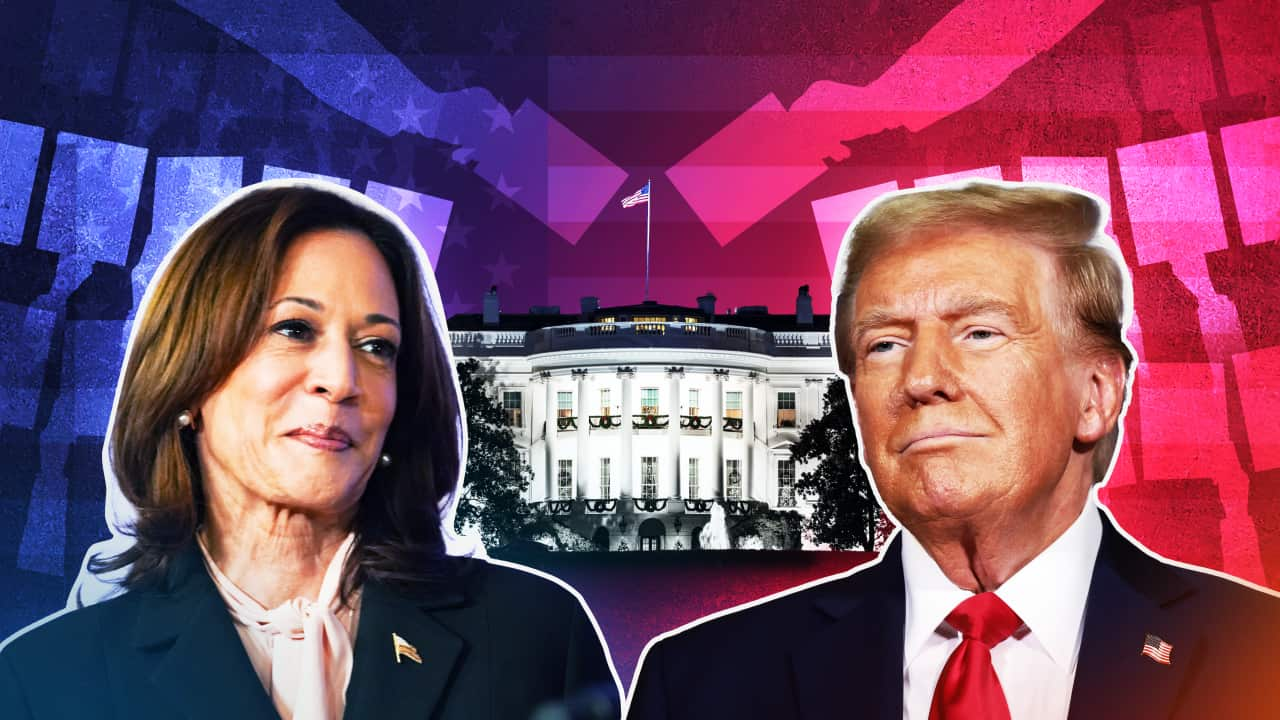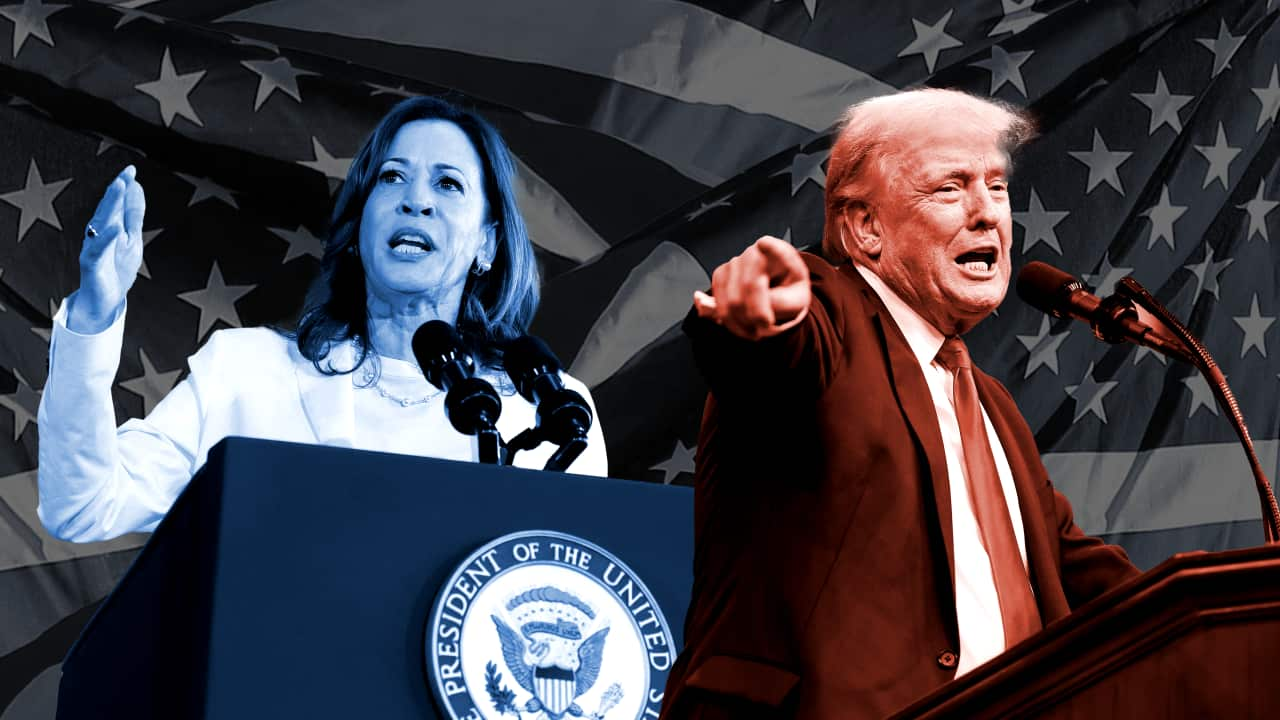The high-stakes race for the White House is entering its final days.
But regardless of whether the or wins the national popular vote, it doesn't necessarily mean they will become president.
That's because the US has an indirect democracy, meaning voters don't directly elect the president.
Instead, a system called the Electoral College is used to determine the newest occupant of the Oval Office.
Here's how it works and why it's contentious.
What is the Electoral College and how does it work?
The Electoral College was established in the US constitution as a compromise between a vote in Congress and a popular vote by citizens.
Every four years, a temporary group of electors is created — and it's technically these people, not the American public, who vote for the president.
There are 538 electors in total. For a candidate to win the presidency, they need a majority of at least 270 electoral votes.
The number of electors allocated to each state is equal to the number of senators and congressional districts they have. For Electoral College purposes, the District of Columbia is treated like a state.

There are 538 electors in total, divided among the states. Source: SBS News
That means that an electoral vote in one state can be representative of the will of fewer people than in another, raising questions about the fairness of the system.
For example, California gets 54 electors for its 39.5 million residents, which works out to over 730,000 people per vote.
By comparison, just over 576,000 live in Wyoming, meaning each of its three electoral votes represents around 192,000 people.
Most states, as well as the District of Columbia, have a "winner-takes-all" approach.
For example, if Trump wins the statewide popular vote in Florida, regardless of how slim the margin is, he'll receive all 30 of its electoral votes. Harris would receive none, even if she secured just 0.01 per cent less of the state's popular vote.
The outliers are Maine and Nebraska, which use a proportional allocation system.
They each award two electoral votes based on the statewide popular votes, as well as one vote for each of their congressional districts. While rare, it can result in a split vote, as happened in both states in 2020.
So, if Harris wins the popular vote in Maine as well as one congressional district, she will receive three electoral votes. If Trump gets a majority in the other congressional district, he will receive one electoral vote.

The Electoral College system is used to determine the US president. Source: SBS News
So, the candidate with the most votes may not win the election?
Yes — the way the Electoral College process works means a candidate can win the national popular vote, but not secure enough electoral votes to become president.
This has happened five times.
The most recent example was in 2016 when Hillary Clinton won 48.2 per cent of the national vote but only secured 227 Electoral College votes — well short of the 270 needed to become president.
Conversely, Trump only won 46.1 per cent of the national vote but was elected president because he received 304 Electoral College votes.
Bruce Wolpe, a senior fellow at the University of Sydney's United States Studies Centre, told SBS News that more Americans were becoming aware of how "undemocratic" the Electoral College system could be.
Those living in historically safe states like Alabama can often feel like their vote "doesn't matter", he said, particularly when they don't support the party that usually wins.
"I think people can get very cynical about it in that we're called 'the greatest democracy' but our democratic institutions don't reflect the will of the people," Wolpe said.
"I think that is a real infirmity in American democracy."
A fragile system — and recent changes
While we may have an idea of how many electoral votes each candidate has won on election night and, therefore, who will become the next president, it's not official until the votes are certified.
Once each state has certified their winner of the popular vote and the electors have been selected based on that result, they then cast their votes for president.
The electors are expected to vote for the winner of the popular vote in their state (or in the case of two of Nebraska and Maine's electors, the winner of each congressional district), but it's not a legal requirement everywhere.
There were seven "faithless electors" in the 2016 election, three of whom voted for former US secretary of state Colin Powell, who wasn't even a presidential candidate at the time.
LISTEN TO

America's great immigration debate: what are both sides saying?
SBS News
15:07
The last step of the certification process happens on 6 January, when a joint session of Congress is held to formally count the votes.
This is where things became unstuck following the 2020 election.
, Trump refused to accept he'd lost and tried to overturn the results.
The former president and his allies , which a Congressional panel found had directly influenced the 6 January riots, where a mob of Trump supporters violently stormed the Capitol building .
Trump has pleaded not guilty to four criminal charges accusing him of a conspiracy to obstruct the congressional certification of the election, defraud the US out of accurate results and interfere with Americans’ voting rights.
At a recent town hall event, Trump said 6 January was a "day of love". Speaking with Bloomberg News, he doubled down, saying the primary scene in Washington was "hundreds of thousands, the largest group of people I've ever spoken before ... and it was love and peace".
"Some people went to the Capitol, and a lot of strange things happened," Trump said.
Some Republicans in a joint session of Congress also tried to dispute the Electoral College results in certain states.
While these efforts failed, they shone a light on one of the US electoral system's vulnerabilities.
In 2022, Congress amended the law that governs how it certifies presidential elections, clarifying who has the power to appoint electors and making it much harder to reject electoral votes.
How rigorously these reforms will be tested in the 2024 election remains to be seen.
With additional reporting by Sam Dover and the Reuters news agency.
Want more politics? You can stream poignant political documentaries in the and keep up with daily news bulletins in the SBS On Demand US Election Hub.



